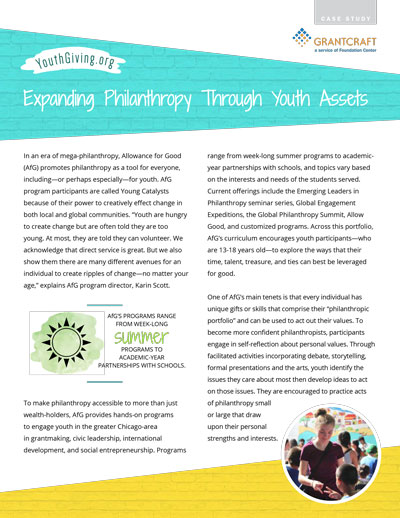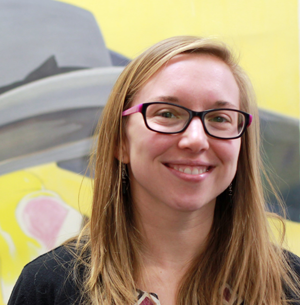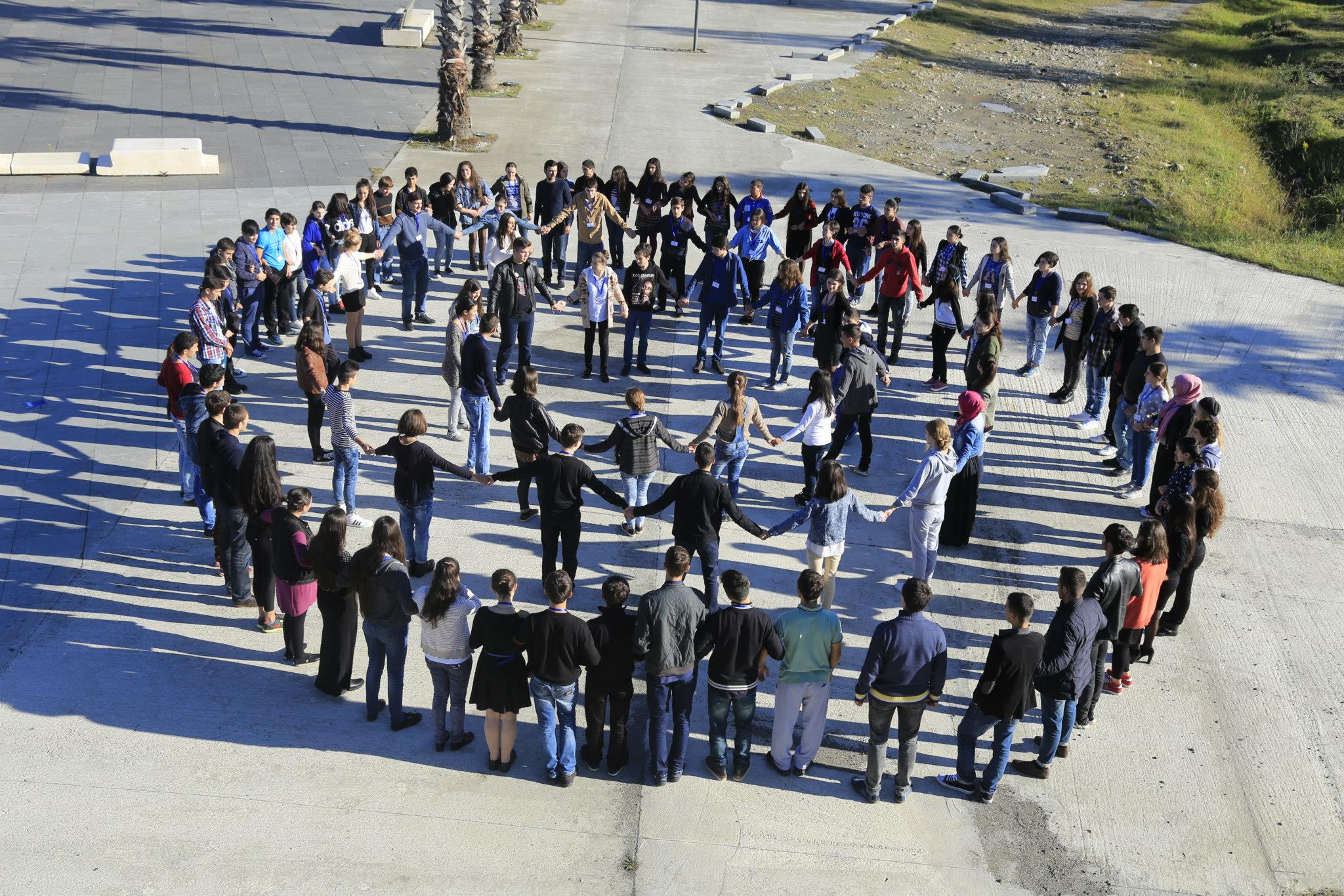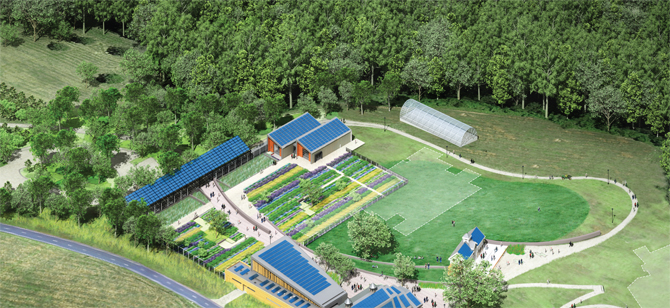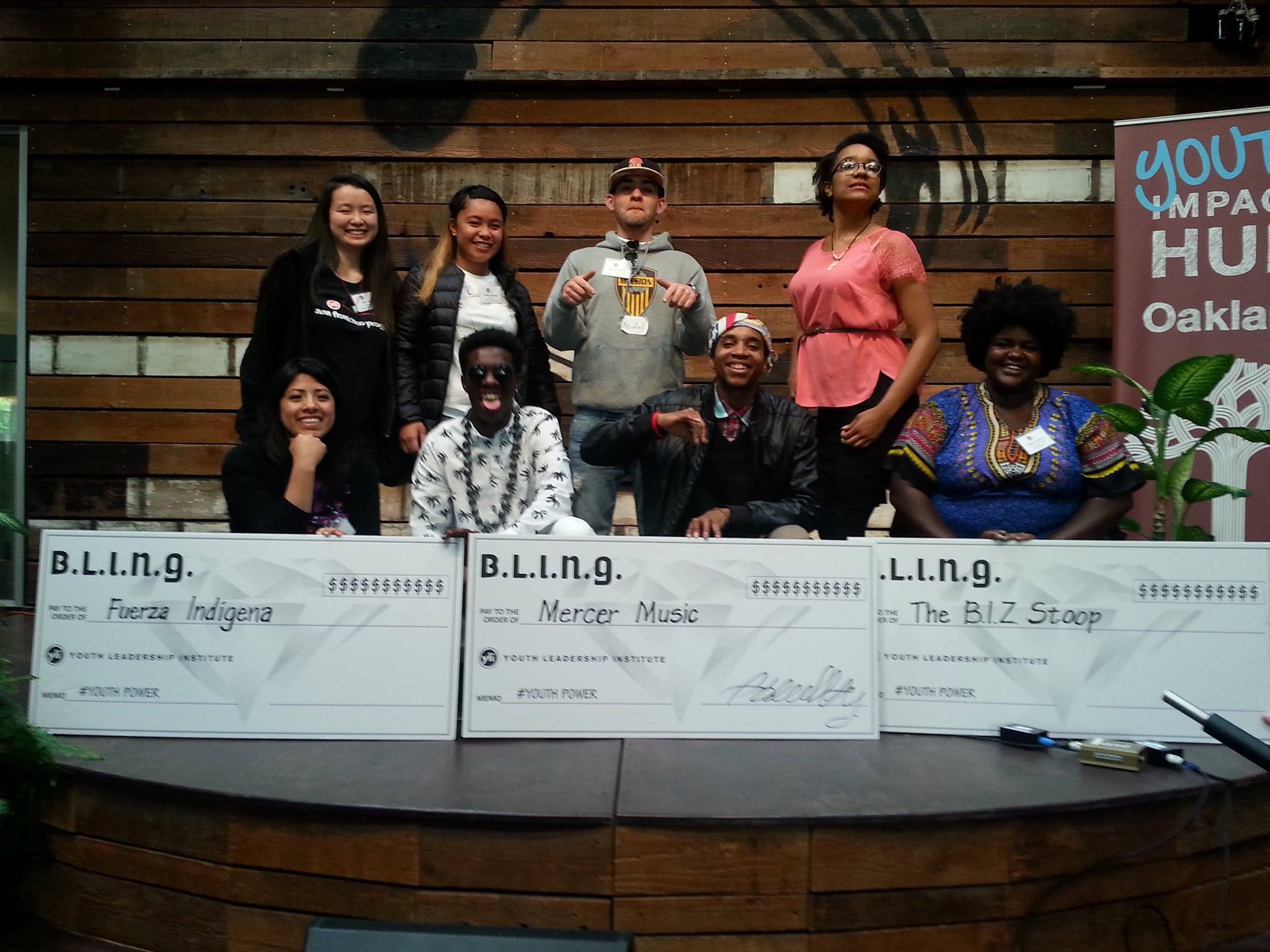Expanding Philanthropy Through Youth Assets
In an era of mega-philanthropy, Allowance for Good (AfG) promotes philanthropy as a tool for everyone, including—or perhaps especially—for youth. AfG program participants are called Young Catalysts because of their power to creatively effect change in both local and global communities. “Youth are hungry to create change but are often told they are too young. At most, they are told they can volunteer. We acknowledge that direct service is great. But we also show them there are many different avenues for an individual to create ripples of change—no matter your age,” explains AfG program director, Karin Scott.
To make philanthropy accessible to more than just wealth-holders, AfG provides hands-on programs to engage youth in the greater Chicago-area in grantmaking, civic leadership, international development, and social entrepreneurship. Programs range from week-long summer programs to academic year partnerships with schools, and topics vary based on the interests and needs of the students served.
Current offerings include the Emerging Leaders in Philanthropy seminar series, Global Engagement Expeditions, the Global Philanthropy Summit, Allow Good, and customized programs. Across this portfolio, AfG’s curriculum encourages youth participants—who are 13-18 years old—to explore the ways that their time, talent, treasure, and ties can best be leveraged for good.
One of AfG’s main tenets is that every individual has unique gifts or skills that comprise their “philanthropic portfolio” and can be used to act out their values. To become more confident philanthropists, participants engage in self-reflection about personal values. Through facilitated activities incorporating debate, storytelling, formal presentations and the arts, youth identify the issues they care about most then develop ideas to act on those issues. They are encouraged to practice acts of philanthropy small or large that draw upon their personal strengths and interests.
“AfG taught me philanthropy doesn’t need to be something I do on the side. It is not limited to just one field—anyone can be a philanthropist. If you dedicate time and talent to helping to create good in the world, then you are a philanthropist,” shares Nina Kaushikkar, a high-school sophomore who has been engaged with AfG programs in a variety of capacities since she was 12 years old. Nina hopes to pursue public service after college, but believes the lessons learned from AfG are relevant to all students regardless of their future career goals.
The majority of AfG’s programs are open enrollment. Staff members also reach out to middle and high school teachers and administrators who in turn nominate students for AfG summer intensives. To expand the reach of its mission and increase access to its programs, the organization launched its newest initiative, Allow Good in the fall of 2015. Allow Good is a collegiate-high school collaboration that replicates the philanthropic grantmaking process in a year-long academic program. As part of this initiative, college students from university chapters across the city facilitate the AfG curriculum with high school students during the classroom day. The pilot initiative pairs college students from the University of Chicago and Northwestern University with over 200 high school students in the South Side of Chicago, Evanston, and Skokie.
Guest speakers at AfG programs discuss the practical fundamentals of grantmaking and corporate social responsibility and introduce the wide range of vehicles used in modern philanthropy. Students hear directly from professionals in diverse careers such as venture capitalism and journalism about the real world and varied applications of philanthropy. They interact with nonprofit professionals working to create change in countries around the world and are exposed to local and global models of social change.
“Part of being a great philanthropist is setting yourself up in a position where you can say these are the assets that I have, these are the assets other communities and people have, and this is how we can collectively work together to address issues we care about,” explains founder and executive director Elizabeth Newton. AfG activities draw upon an Asset-Based Community Development (ABCD) framework to help students understand how communities grow and thrive. This process involves mapping existing community strengths as well as understanding the historical context underlying challenges and opportunities.
Young Catalysts learn to apply a modified ABCD framework to connect their values with their personal philanthropy. They map out the individuals, events, and accomplishments that have most inspired and shaped their lives, and chart out different facets of their social identity such as gender, race, and class. Such activities help youth better understand how they are situated in their communities and the world, and how they want to give back.
Self-awareness, dialogue, and appreciative inquiry are modeled as cornerstones to effective philanthropy. There are continuous opportunities for respectful but sometimes uncomfortable conversations about tough social challenges. With this foundation, students directly practice philanthropic competencies by making grants, researching nonprofits, enacting fundraising campaigns, and leading community service projects.
Giving circles are also leveraged to help students think critically about why and how they want to make a difference. AfG provides pools of mini-grants ranging
from $500-$1000 that students collectively distribute. During AfG’s shorter-term programs with a more global focus, students select grant recipients from among a pre-existing group of global affiliates. Following the submission of a formal request for partnership, AfG staff cultivate relationships with nonprofits advancing education for youth in resource-poor communities around the globe. These affiliates are invited to apply for the mini-grants and the proposals are passed to students for review.
Ross Orgiefsky of Evanston, Illinois participated in one of the globally-focused giving circles, and his group came up with a series of criteria used to select a winner: “We asked ourselves, where can our money do the most good? Where can it make the most impact? Who needs it the most? We really found a way to compromise and work together.” As the culmination of the year-long Allow Good program, high school students are involved in the grant selection process from start to finish. They democratically select the issue they feel is most important in their neighborhood, research local groups working on that issue area, and make decisions about where to allocate funds.
The emphasis on democratic conversation and group action is very intentional. Newton shares, “We are helping youth to understand that their space in the philanthropic sector can be a really significant one especially when they work collectively. And it is a place for them to start their learning now so that they can be informed contributors to society both today and throughout their lifetimes.”
Young Catalysts leave AfG excited about sharing their time, talent, and treasure. After making reallife decisions about how to fundraise and give away money, students better understand their own leadership capacities. With practice in asset-based assessments and collective decision-making, they are equipped to talk about social challenges with peers and adults. Inspired to create the change they wish to see, youth have gone on to launch sports equipment drives, create social enterprises, and host a community dinner series.
Rather than place limitations on youth impact, the underlying assumption of programs like Allowance for Good is that youth can contribute significantly in a variety of capacities right now. This inherent trust inspires confidence and courage. With the space to make decisions and implement ideas, students are highly engaged and cultivate lasting civic and global leadership skills, while also contributing to the community.
This case study was developed for Foundation Center's project YouthGiving.org, a hub to inspire, connect, and inform youth grantmaking.
